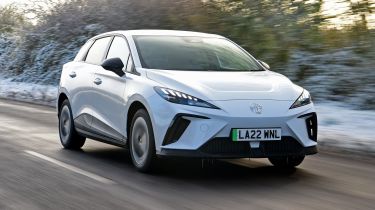What is a heat pump in an electric car? Range-boosting EV feature explained
Here’s why you might want a heat pump in your next electric car

Heat pumps are appearing in people’s homes as an alternative, more efficient way to turn up the temperature. However, this technology can also play a crucial role in boosting an electric car’s efficiency as well as increasing your comfort.
So what exactly is an electric car heat pump, and is it worth choosing one as an option? Read on and we’ll explain how this device works and why they’re ultimately a worthwhile investment.
What is an electric car heat pump?
The quick version is that heat pumps are an efficient way to move heat around from where it’s not wanted to where it's needed. In an electric car, a heat pump is used to get the cabin up to temperature using heat from the battery pack. Seeing as most EVs now come with a mobile app, many models will allow you to warm up the car before you even set foot outside of the house.
Electric cars can also use their heat pumps to keep the battery at an optimal temperature to improve charging performance, range and battery longevity. This is particularly beneficial in cold weather when lithium-ion batteries tend to perform less well. If the weather is too hot for the battery to operate efficiently, the pump can also help to cool it. Either way, the objective is to maximise efficiency and eke the most range out of a single charge.
How does an electric car’s heat pump work?
Heat pumps use a compressor and a series of tubes full of refrigerant. The refrigerant is a substance that absorbs heat from the environment around it, turning from a liquid into a gas. As it cools, it condenses back into a liquid, releasing heat.
We can control where this heat absorption and release happens so as the refrigerant moves through the heat pump’s tubes it brings heat from the battery into the car’s cabin. The cycle is the reverse of what happens in your fridge at home.
It’s the same principle as the air-conditioning in any car, although heat pumps are optimised for heating rather than cooling. In an electric car the system can also be reversed and this is used to bring warmth from the cabin to the battery when the car is charging, which improves battery life and capacity - EV batteries don’t like cold weather.
It takes some energy to run the compressor for the car’s heat pump, but it’s a lot less than would be needed to power a normal electric heater. Heat pumps do a lot to increase the efficiency of an electric car and keep the battery at an optimal temperature, so they are a very worthwhile addition to any electric car’s specification.
Like air-con on petrol cars, we’re sure heat pumps will become a must-have addition to any EV in the years to come. Currently some electric cars have heat pumps fitted as standard but many still only offer them as a cost option for buyers.
Why haven’t heat pumps been used on cars before?
Heat pumps haven’t been popular until now because car engines already produce loads of excess heat in the combustion process, which is used to keep the cabin warm when needed. It’s only with electric cars where this tech can be used to its full potential.
Electric car batteries produce some heat, but it’s not enough to keep the cabin warm without a bit of help. EVs without a heat pump use a normal electric heater to keep the cabin warm, which isn’t very efficient.
Should I add a heat pump as an optional extra?
An increasing number of electric cars come with heat pumps as standard. Models like the Renault Scenic, Renault Megane, Nissan Ariya and BMW i4 have a heat pump fitted across the range, but others like the Volkswagen ID.3 and Skoda Enyaq offer them as an option or only on pricier trim levels.
If your prospective electric car purchase doesn't come with a complimentary heat pump, we’d still recommend investing the extra cash in fitting an optional one.
Not only do heat pumps work more efficiently than normal electric heaters, but they also keep the battery in better condition than a car without. For that reason, we’d recommend a heat pump as an optional extra over virtually anything else you can add to your new EV. You can expect about 10 per cent more range in your EV when it’s fitted with a heat pump, which is pretty significant and well worth the money.
Heat pumps are also great for getting the cabin to a comfortable temperature before you even set foot into the car (called pre-conditioning). This is usually done through the car’s app which lets you set the time you want to begin your journey and the temperature you’d like the cabin to be at that point. In the winter, this process will clear any ice from the car’s windows, too. Heat pumps are also desirable on second-hand cars so will improve resale value when you come to sell the car, too.
If you live somewhere with mild to warm temperatures all year round then a heat pump might not offer a huge benefit, but to virtually anyone in the UK and colder countries, a heat pump should be a top priority when choosing optional extras on an electric car.
Need to top up? Read our guide to electric car charging in the UK...
Your electric car questions answered
- Electric car FAQ
- Should I buy an electric car?
- What’s the best way to buy an electric car?
- Is a hybrid, plug-in hybrid or electric car right for me?
- Should I buy a used electric car?
- Can I get a plug-in car grant?
- How is electric car range calculated?
- How much do electric cars cost to charge?
- How much do electric cars cost to run?
- How long do electric car batteries last?
- What happens to old electric car batteries?
- Should I get a heat pump on my electric car?
- What are fast charging and rapid charging?
- Should I get a home electric car charger?
- Can I tow with an electric car?
- Is wireless electric car charging the future?
- What’s the history of the electric car?









